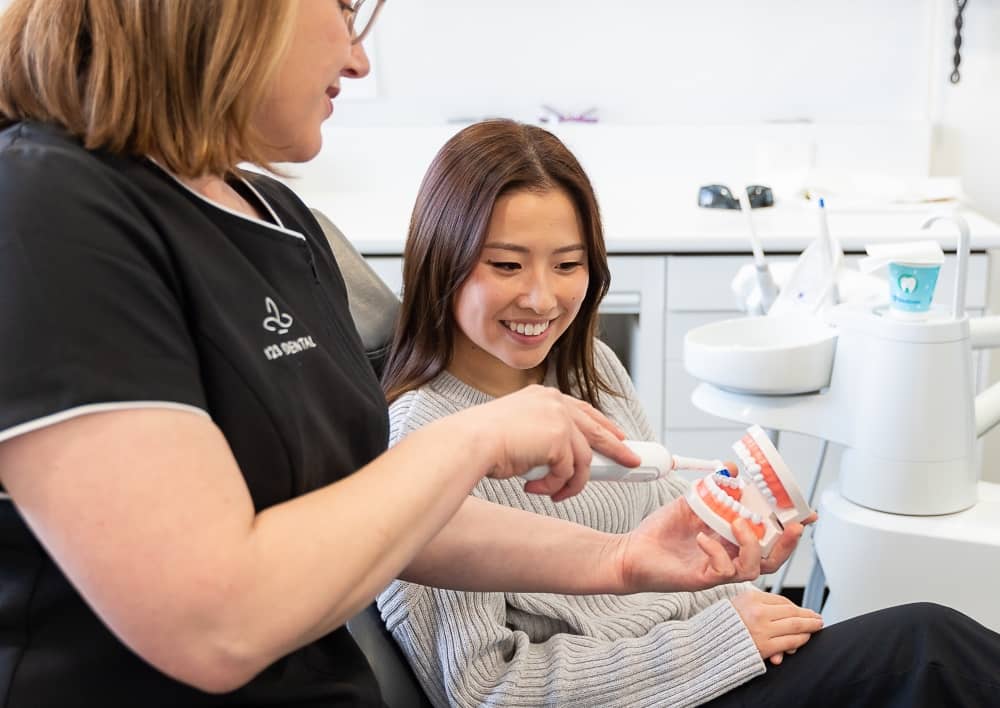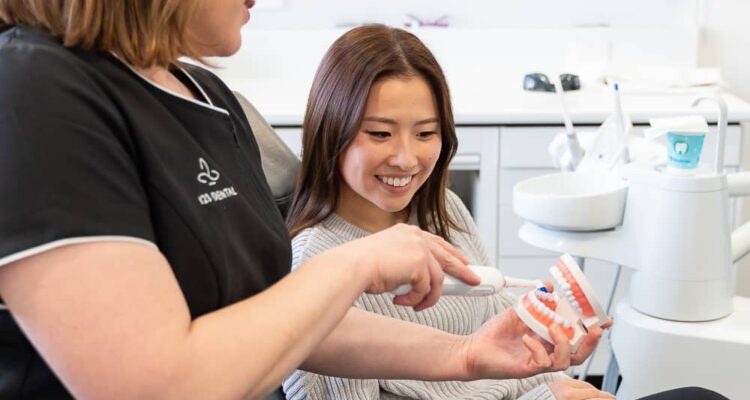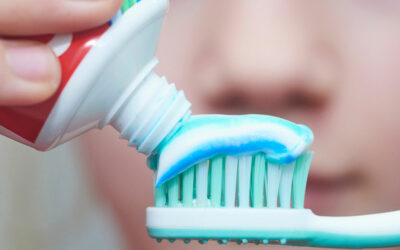There are many common dental myths. Unfortunately, some of these may have a negative effect on your oral health. We’re here to make sure you know the truth so you can keep your smile, teeth, and gums as healthy as possible.
Read on to learn about common dental myths and the truth behind them.

Debunking Common Dental Myths
You Can Skip General Dental Checkups If You Aren’t Having Problems
Are you tempted to skip your twice-yearly general dental checkups if your mouth and teeth feel healthy? It’s important to remember that general dental checkups focus heavily on prevention.
These checkups allow your dentist to detect oral health problems as early as possible. Early detection of oral health issues leads to easier treatment, which can save money on treatment costs, and prevents issues from becoming more complicated than necessary.
According to the Australian Institute of Health and Welfare, there were 3.2 per 1,000 population potentially preventable hospitalisations due to dental conditions in 2020 and 2021.
For example, gum disease often lacks symptoms in the early stages. Without regular dental checkups, gum disease can be missed in the early stages and allowed to progress. Untreated gum disease can lead to decay, infection, swollen and sore gums, health complications, and even tooth loss.
So even if you are keeping up with your oral hygiene routine and everything seems fine, it is still important to see your dentist twice a year to get the benefits of general checkups.
Dental Procedures Are Painful and Uncomfortable
One of the biggest dental myths is that all dental procedures are painful or uncomfortable. This myth is so persistent that the Australian Dental Journal estimates that 1 in 6 Australians experience dental anxiety.
Whether you are here for a filling, root canal treatment, whitening treatment, or emergency dental care, our experienced, caring team aims to keep you at ease through any appointment.
If dental anxiety is a serious concern for you, there are alternatives to help you. Services such as sedation dentistry can help nervous patients get the dental care they need without the overwhelming worry and anxiety they normally feel.
Only Sugar Causes Tooth Decay
- Lollies.
- Candies.
- Cakes.
- Gummies
- Cookies.
- Cereals.
We know that sugary foods are bad for teeth, and sugar consumption is linked to an increased risk of tooth decay and other oral health problems. This is because plaque-forming bacteria consume sugar and create harmful acids that damage tooth enamel.
Starchy, high-carbohydrate foods also contribute to plaque formation. The body breaks carbohydrates down into sugar, so it is important to pay attention to your diet and the ingredient labels on the foods you buy.
Juice and Diet Soft Drinks Are Better for Your Teeth
Have you ever grabbed a can of diet cola and thought you were doing your teeth a favour?
Not at all!
Diet soft drinks and seemingly healthy fruit juices are both extremely damaging to teeth. While diet soft drinks are ‘sugar-free’, they are still acidic. This acidity damages tooth enamel, contributes to tooth sensitivity, and can lead to various oral health issues.
The high sugar content in fruit juice is also problematic. While the sugar in fruit juice is ‘natural’, it is still damaging to teeth.
Gum Disease Is Only an Oral Health Problem
Often, patients hear the term gum disease and think it only pertains to the mouth. However, untreated or severe gum disease can affect the entire body and increase your risk of several serious health conditions.
Along with gum disease, other oral health issues can affect the entire body, making oral health and overall health closely linked.
Fluoridated Water Is Bad for You
Many people express concerns about drinking fluoridated water. However, fluoridated water is proven to help strengthen teeth and fortify them against decay.
Fluoride strengthens teeth by improving their mineral composition. By fortifying tooth enamel, teeth are better protected against damage from exposure to acids and bacteria.
The consumption of fluoridated water is recommended by Australia’s National Health and Medical Research Council:
“Along with a combination of healthy diet, good oral hygiene, appropriate use of fluoridated toothpaste and regular dental check-ups, water fluoridation is an effective public health measure to prevent tooth decay.”
All Teeth Whitening Techniques Damage Teeth and Cause Sensitivity
A bright, white smile is a great way to increase your confidence as you go about your daily life. It isn’t surprising that teeth whitening is the most popular cosmetic dental procedure.
However, many people worry that teeth whitening causes damage to tooth enamel and aggravates tooth sensitivity. These issues may occur from the use of over-the-counter whitening strips or toothpaste. Because they are used unsupervised and often require frequent use to see results, it is easy to overuse these whitening options. Overuse can lead to damage to tooth enamel and gums and cause tooth sensitivity.
Professional teeth whitening is a painless process that produces instant, long-lasting results. Because it is supervised by a professional, it is considered the most effective, safest form of tooth bleaching.
If you struggle with sensitivity, your dentist can utilise a thicker peroxide gel or desensitisers to minimise irritation and sensitivity.
There are also medical-grade take-home whitening kits. These custom whitening trays can be used overnight from the convenience of your own home. Take-home whitening kits take longer than in-chair whitening but still deliver exceptional, dramatic results in minimal time.
For any whitening procedure, it is imperative to follow your dentist’s instructions closely and ask if you should be using whitening toothpaste at home.
Dental X-Rays Are Dangerous and Unnecessary
Patients often mention concerns about radiation from dental X-rays. Fortunately, modern dental X-ray machines deliver a minimal amount of radiation exposure. The use of lead aprons and special covers to protect the thyroid further reduces radiation exposure.
As one of the most effective diagnostic tools used by dentists, X-rays can reveal a wide range of dental conditions that may otherwise go undetected.
X-rays can pinpoint hidden issues such as:
- Impacted teeth
- Early signs of gum disease
- Decay or cavities
- Bone loss
As with all oral health issues, early detection is key. Treating issues such as gum disease or decay as early as possible minimises pain, reduces the risk of further complications, and ensures the cheapest treatment possible.
Dental X-ray machines are designed to minimize radiation and deliver only a small amount of radiation during the procedure.
Braces Are Only for Children and Teens
Many people equate braces with teenagers. But it is becoming increasingly common for adults to seek orthodontic correction through braces.
Advances such as Invisalign allow for a discrete, comfortable treatment that offers impressive results.
Gone are the days of visible metal brackets and avoiding hard or crunchy foods. Invisalign allows patients to straighten their teeth while still eating their favourite foods, feeling confident about their smile, and going about their daily activities without interruption.
The Harder You Brush, the Cleaner Your Teeth Will Be
Some patients believe that brushing harder will result in cleaner teeth. Unfortunately, aggressive brushing can erode your tooth enamel and damage your gums. This is especially true if you are brushing aggressively with a hard-bristled toothbrush.
Instead, use a soft-bristled toothbrush and gentle, circular motions to clean your teeth for two minutes. This technique is effective for removing food debris and plaque while protecting your enamel and gums.
Patient education is one of our top priorities and we’ll gladly go over proper brushing techniques with you to ensure you are effectively cleaning your teeth without overdoing it.
You Can Chew Gum Instead of Brushing Your Teeth
No time to brush your teeth? Have you ever grabbed some chewing gum instead?
Sugar-free gum can help stimulate saliva production, but it shouldn’t be seen as an alternative for properly brushing your teeth.
If you practice a good oral hygiene routine that includes daily brushing and flossing, an occasional piece of sugar-free chewing gum is just fine.
You Can Skip Flossing As Long As You Brush Every Day
Some individuals believe that they can skip flossing as long as they brush regularly. This dental myth puts you at risk of serious dental health issues.
Flossing is a crucial part of a good oral hygiene routine. Flossing can reach into tiny crevices and gaps that are impossible to reach with a toothbrush.
Removing particles and debris from these crevices helps prevent the buildup of bacteria and plaque. Keeping debris out of these tiny gaps can significantly reduce your risk of decay, cavities, gum disease, infection, and other oral health issues.
Want More Tips About Caring for Your Oral Health?
We hope we’ve cleared up these common dental myths so you can take better care of your oral health.
If you want to learn more tips about keeping your teeth and smile as healthy as possible, we encourage you to check out our dental blog. Our dentists provide expert advice on dental issues, oral hygiene, teeth whitening, plaque, teeth grinding, veneers, dental implants, bad breath, teeth sensitivity, Invisalign — all things dental!









 Hi, you’re chatting with Chloe. If you could please fill out all your details below, I will be in contact with you shortly.
Hi, you’re chatting with Chloe. If you could please fill out all your details below, I will be in contact with you shortly.